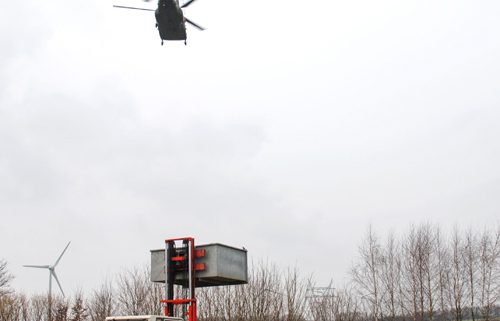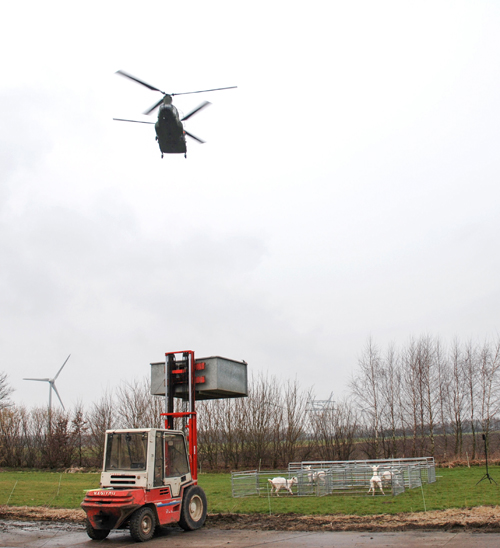Overflying helicopters do not cause goats to experience high levels of stress. Rather, low-flying helicopters only produced brief, surprised reactions in the goats. Moreover, the goats’ heart rates and production of stress hormones remain unchanged. These findings stem from a joint research project that the National Aerospace Laboratory (NLR), and Wageningen University and Research Centre (Wageningen UR), conducted on behalf of the Dutch Ministry of Defense.
The Ministry of Defense asked NLR and WUR to study the possible effects that low-flying helicopters have on the milk production of dairy goats. If the goat milk production was negatively impacted, the ministry would then conduct additional research to determine how to limit noise disturbance or damage caused by low-flying helicopters. The ministry asked NLR to conduct this research because of its knowledge and experience in the field of helicopter operations and helicopter noise, and the BioMedical Research Center of WUR’s Animal Sciences Group because of its experience in stress level research in animals.
A comprehensive study of the available literature on this subject provided no support for the contention that low-flying helicopters caused lower milk production levels in goats. Nor were any reliable measurement statistics available from the dairy goat farming sector. Consequently, the researchers evaluated goats under controlled circumstances at an experimental farm.   During the experiments, non-milk producing goats, confined to a stall, were exposed to optical stimuli (pictures), acoustic stimuli (sounds) and a combination of images and sounds produced by a helicopter. In addition to this, the goats were put out to pasture and exposed to a Chinook CH-47D helicopter making successive flyovers at heights of 75 meters and 50 meters. Intense and prolonged stress has been proven to negatively impact the health of zoo animals. The researchers therefore measured the goats’ heart rates and the concentrations of the stress hormone cortisol present in their saliva (degree of stress). The goats’ locomotion (movements of the goats) was also measured.
To the researchers’ surprise, the tests revealed that the goats did not experience intense stress reactions during or after their exposure to the images and sounds of an overflying helicopter. Moreover, when the goats were exposed to an actual Chinook flying overhead, the goats did produce brief, surprised reactions, but their heart rates and cortisol concentrations remained unchanged. Based on these research results, the researchers were able to conclude that it is improbable that overflying helicopters negatively effect the milk production of dairy goats.




